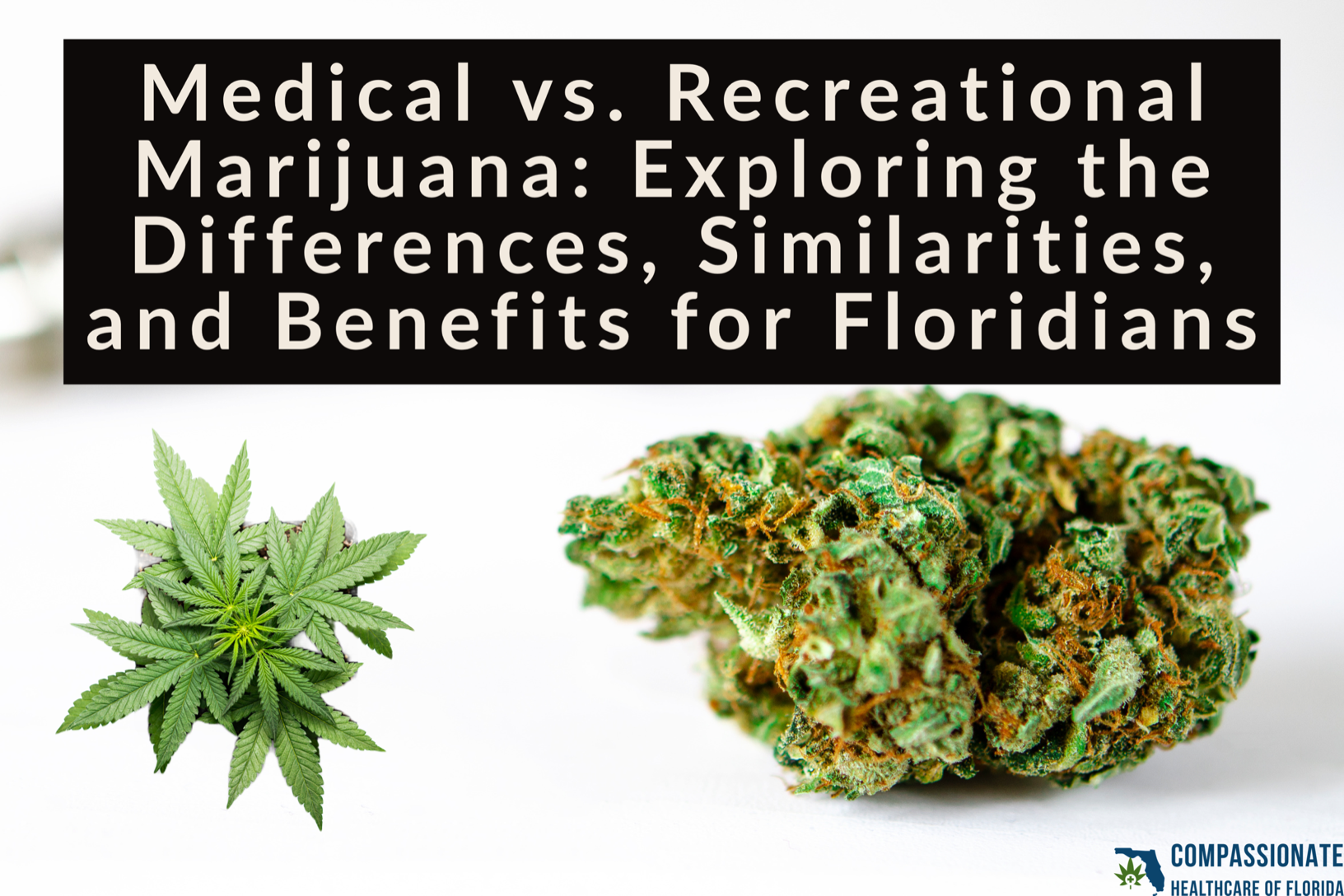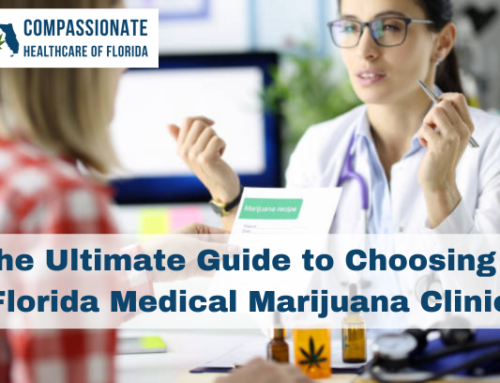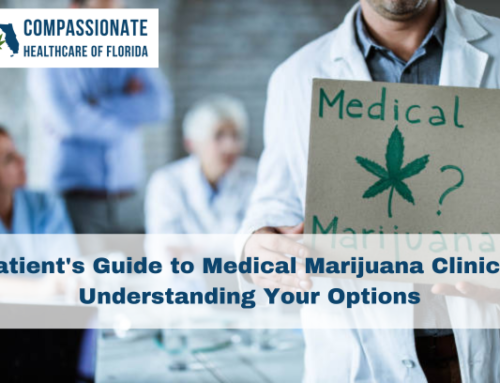 As the conversation surrounding marijuana evolves and its legalization expands, it’s essential to understand the differences between medical and recreational marijuana.
As the conversation surrounding marijuana evolves and its legalization expands, it’s essential to understand the differences between medical and recreational marijuana.
While both types of cannabis come from the same plant, they serve different purposes and offer various benefits. In this article, we’ll delve into the distinctions, similarities, and advantages of medical and recreational marijuana, providing valuable insights for Floridians who are considering incorporating cannabis into their lives.
By the end, you’ll understand which type of marijuana might be right for you in Florida.
The Purpose: Relief vs. Enjoyment
The primary difference between medical and recreational marijuana lies in their intended use.
Medical marijuana is specifically designed for patients who require cannabis for relief from a range of mental or physical health conditions. On the other hand, recreational marijuana is meant for those who wish to consume cannabis for enjoyment, relaxation, or social purposes, without a specific medical need.
Legal Aspects: Medical Marijuana in Florida
While many states have legalized both medical and recreational marijuana, Florida currently permits only medical marijuana.
Floridians must obtain a medical marijuana license issued by the Florida Department of Health via licensed cannabis doctors to access cannabis for medical purposes legally. Floridians must stay informed about the legal landscape and adhere to state regulations when considering cannabis.
Strains and Potency: Customized vs. General
Medical marijuana is often tailored to meet specific patient needs.
It may come in strains with varying ratios of cannabinoids, such as THC and CBD, to effectively address different symptoms or conditions. Medical marijuana may also have higher potency levels to provide relief to patients who require a stronger dose.
In contrast, recreational marijuana is generally available in a wide variety of strains, with varying potencies to cater to different preferences and experiences. While recreational users may seek strains with higher THC content for a more intense psychoactive experience, others might opt for balanced or CBD-dominant strains for a milder effect.
The Dispensaries: Medical-Grade vs. General Availability
Medical marijuana dispensaries or MMTC’s in Florida are strictly regulated and must meet specific quality and safety standards.
These dispensaries must have knowledgeable staff who can guide patients in selecting the right products and dosages based on their medical conditions and recommendations from their healthcare providers. Medical grade products can be extremely high in THC; however, the product lines are usually tailored to be a more therapeutic combination or THC, CBD, terpenes and flavonoid profiles to best treat specific conditions.
Recreational marijuana dispensaries, where available outside of Florida, typically offer a more extensive range of products and may cater to a broader clientele. While the quality of recreational marijuana can still be high, the focus is generally on providing a variety of strains and consumption methods to suit different tastes and preferences.
Consumption Methods: Tailored to Patient Needs
Medical marijuana is often available in various forms and consumption methods, including flowers, oils, tinctures, capsules, edibles, topicals, and vaporizers.
These options allow patients to find the most suitable method for their condition and personal preferences with the guidance of their healthcare provider or cannabis doctor. Some medical marijuana products, such as topical creams or transdermal patches, are specifically designed for targeted relief, offering localized pain relief without causing a psychoactive effect.
Recreational marijuana users typically have access to various consumption methods, including smoking, vaping, edibles, and concentrates. The focus in recreational consumption is often on personal enjoyment and preference rather than targeted relief or specific medical benefits.
Potential Benefits: Medical vs. Recreational
Medical marijuana can offer numerous benefits to patients, from alleviating chronic pain and inflammation to reducing anxiety, depression, insomnia, and PTSD symptoms.
It can also help manage the side effects of specific medical treatments, such as chemotherapy-induced nausea and vomiting. Additionally, medical marijuana has shown promise in treating conditions like epilepsy, multiple sclerosis, and Crohn’s disease, providing relief and improving patients’ quality of life.
Recreational marijuana users may also experience some benefits, such as relaxation, stress relief, enhanced creativity, and social bonding. Consuming cannabis in a recreational setting can facilitate open-mindedness and stimulate engaging conversations, fostering deeper connections with others. Moreover, some recreational users may find that marijuana helps to alleviate everyday aches and pains, or promotes better sleep, even though it is not specifically tailored for medical purposes.
However, it’s essential to note that recreational marijuana use is primarily intended for enjoyment and personal preference rather than targeted symptom relief or specific health benefits. While there may be some overlap in the benefits experienced by medical and recreational users, the focus of medical marijuana is to provide therapeutic effects for patients with specific conditions.
In contrast, recreational marijuana is geared towards enhancing users’ overall experience and enjoyment.
Risks and Side Effects: Awareness and Moderation
Both medical and recreational marijuana use can be associated with certain risks and side effects.
These may include dizziness, dry mouth, impaired coordination, and increased heart rate. It’s essential for users, mainly those new to cannabis, to be aware of these potential side effects and consume marijuana in moderation.
For medical marijuana patients, it’s crucial to follow their healthcare provider’s recommendations and report any adverse effects. Recreational users should educate themselves on responsible consumption practices and be mindful of the potential risks associated with cannabis use.
The Cost: Insurance Coverage vs. Out-of-Pocket
Medical marijuana patients in Florida will find that the cost of their cannabis products is not covered by insurance.
However, the expenses related to obtaining an MMJ card and regular doctor visits for renewals may be eligible for coverage, depending on the rules and flexibility of an individual’s HSA plan.
Recreational marijuana users, where it is legal, typically pay for their cannabis products out-of-pocket, with prices varying depending on factors such as product type, quality, and regional availability.
Making an Informed Choice in Florida
Understanding the differences, similarities, and benefits of medical and recreational marijuana can help Floridians make informed decisions about cannabis use.
While medical marijuana offers targeted relief and potential health benefits for patients with specific conditions, recreational marijuana caters to personal enjoyment and social experiences.
If you’re a Floridian considering medical marijuana to improve your quality of life, don’t wait any longer. Contact Compassionate Healthcare of Florida to apply for your medical marijuana license and start experiencing the benefits of premium medical cannabis today.



